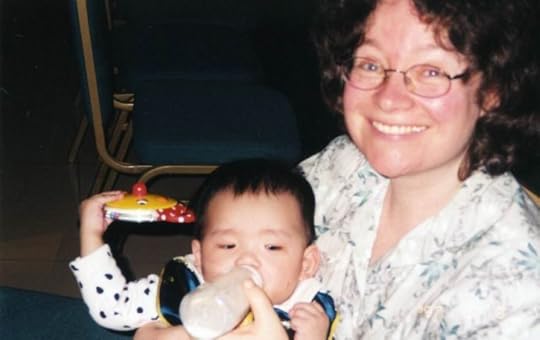Lilian Nattel's Blog, page 12
January 10, 2013
Leaves in January
That time of year thou mayst in me behold
When yellow leaves, or none, or few, do hang
Upon those boughs which shake against the cold,
Bare ruined choirs, where late the sweet birds sang.
click to enlarge
There was a cute resident at the fracture clinic where H had the final xray on her arm this week. The clinic specializes in cute male resident pediatricians. But alas…Hadara is too young to appreciate and I am too old to flirt, which is both a loss and a relief, since I was never adept at it. Inside, however, I’m as young as ever, and grinning.
Filed under: Miscellany Tagged: urban photography


January 9, 2013
Handy Words That Don’t Exist In English
Arigata-meiwaku (Japanese): An act someone does for you that you didn’t want to have them do and tried to avoid having them do, but they went ahead anyway, determined to do you a favor, and then things went wrong and caused you a lot of trouble, yet in the end social conventions required you to express gratitude
via 25 Handy Words That Simply Don’t Exist In English | So Bad So Good.
For more handy words, click on the link above.
Filed under: Interesting Tagged: language


January 8, 2013
Perspective

winter flowers, click to enlarge
I held the camera under the flowers and pointed up, surprising myself in the frame.
Filed under: Fun, Interesting Tagged: urban photography


January 7, 2013
The Process: 10 Years Ago
As you’ll know if you follow my blog, I sent off the first draft of a fun new book to my agent. He is a dear as well as smart, but not the fastest responder. So while waiting, I had in mind to return to embark (again) on another the first draft of a historical novel I began researching 10 years ago. I was younger then; so were my children:

Lilian and H in China
Filed under: Literary, Personal Tagged: researching historical fiction


January 6, 2013
Albert Nobbs

Glenn Close as Albert Nobbs and Janet McTeer as Hubert Page
via Gallery for Albert Nobbs
Throughout history, there have been women who have lived as men either because of gender identification and/or for safety and opportunity as soldiers, pirates and doctors, for example. (This includes James Barry, an 18th century surgeon who became the Inspector General for military hospitals.)
In this fine movie, Glenn Close plays Albert Nobbs, a timid, asexual person, a sad little man (or woman) who is a waiter in a posh hotel in the 1890s. Albert encounters Hubert Page (Janet McTeer), who is bigger physically and stouter of heart, living as a man externally and happy domestically in a lesbian relationship. Their encounter sets in motion a series of events that speaks to gender and life as a woman…or man subjected to social definitions and the violation and humiliation that enforce them. How to react? Shrinking, hiding, transforming, re-enacting, departing, being bold, being shy, always secretive.
What interested me most about the movie is that it’s based on a short story written by George Moore and first published about 1918. I was struck both by the date (end of WWI and several generations earlier than the most recent incarnation of gender studies) and the author.
I know him as the author of Esther Waters, a neglected and wonderful novel written in the 1890s about a single, working-class mother. So I was interested to learn about his ongoing personal and literary interest in gender identity and sexuality. Now I’m very curious to read the collection in which the original story, “The Singular Life of Albert Nobbs” appeared.
In the meantime I can recommend this thought provoking article about sex and gender in Albert Nobbs. I also recommend the DVD!
Filed under: Interesting, Literary Tagged: Albert Nobbs, George Moore, women living as men


January 4, 2013
Princess Shoes
These were custom made for Princess Lilian of Belgium, designed by Roger Vivier, whom I gather from my visit to the Bata Shoe Museum, was the shoe to M. Dior’s dress. You notice that she’s my namesake.
But these, made for nobody with a crown, are more to my taste. They were sewn and decorated c. 1900 by women of the Caddo, Native Americans in Oklahoma.
That led me to read about the Caddo who lived along the Red and Mississippi Rivers in populous farming villages around the time of the Plague in Europe. Their contact with Europeans began in the 1540s, and we all know what came of that. But even after 350 years of depletion by disease and everything else that came with European settlement, their vitality persists; you can see it in those shoes, beautifully made for someone the maker cared about. Maybe this woman.

Photo of Caddo woman, 1906
Filed under: Interesting Tagged: Bata Shoe Museum, Caddo


January 2, 2013
Nutcracker
The choreography, sets, and costumes were new, at least to me. This was my family’s Christmas present from A’s mom: row F, seats 14 to 17. I haven’t seen The Nutcracker for years, not since I became a mom myself, and I’ve always wanted to take my children. It was magical. (Slightly less so for the hockey playing child who, nonetheless, got caught out in admitting how cute the little lambs were.)
I was enthralled.
Filed under: Fun Tagged: National Ballet of Canada Nutcracker


Bravery: the Writer
I want to tell you about a writer who looked old in his mid-30s. He walked with a cane. He was overweight, lethargic, pasty-faced and depressed. It was no wonder. He was a writer trying to write vividly, truthfully and with compassion under a totalitarian regime. He believed in the socialist dream, at least he had believed in it once, and his writing is also rich with psychological portraits of people who ambivalently struggle with the crash of ideals and disillusionment.
Vasily Grossman’s first short story, “In the Town of Berdichev”, was published in a Soviet literary magazine in 1934. By 1937 the Terror as it was known was in full swing. By the end it would scoop up 700,000 people and send them to the gulag and execute another 700,000 people. Among those arrested was Grossman’s wife and her ex-husband. Her two young sons aged 11 and 6, who had been living with her ex in a communal apartment, were alone and destined to be separated, sent either to a slave labour camp for children or to an orphanage for children of “enemies of the people,” which was much the same thing.
Grossman rushed to their room, took them home, and applied for guardianship. He also wrote to Yezhov, the head architect of the Terror, the man in charge, and appealed on his wife’s behalf. It was a crazy move. Miraculously she was released within the year. It could just as easily have gone the other way with his arrest.

WWII, A Lull at Stalingrad
When war came and the Nazis invaded the Soviet Union in 1941, Grossman was devastated and haunted by the death of his mother and extended family, all Jewish, under the Nazis in the Ukraine. Nevertheless the war invigorated him. He lost his lethargy and his ill-health on the front. He also turned out to be a crack shot. He refused to hang back on the safer side of the Volga River during the battle for Stalingrad or write from the rear. Traveling everywhere at the front, he lived with combat soldiers, who couldn’t wait to read his reports and stories in the Red Star. Imagine a group of soldiers, exhausted in body, heart-weary, hungry. The smell of burning. The smell of blood. They are huddled around a fire. One of them has a ragged newspaper, which has been passed from unit to unit. He reads aloud. The others listen hungrily. They sigh, satisfied.
Post-war, his bravery was a matter of persistence, writing his truth despite persecution and threat. He lived only because Stalin died. He died too young, at age 58 or 59, not knowing whether his major novels would ever be read by the public. They were eventually smuggled out, translated and published.
Jeffrey Eugenides advises writers to write posthumously. Vasily Grossman did. He was a great man and I hope that I can follow in his footsteps (without the totalitarianism thank you!) in a small way.
Filed under: Literary Tagged: Stalingrad, Vasily Grossman


January 1, 2013
Writer’s New Year Resolutions
1. Create more, worry less. (h/t Diane Shoemperlen)
2. The market isn’t Stalin. Have fun writing.
3. The market is Stalin. Be subversive.
[A]n invisible force was crushing him. He could feel its weight, its hypnotic power; it was forcing him to think as it wanted, to write as it dictated. This force was inside him; it could dissolve his will and cause his heart to stop beating…
From Life and Fate by Vasily Grossman, quoted on page 73 of The Road: Stories, Journalism and Essays by Vasily Grossman, edited by Robert Chandler.
[image error]
Vasily Grossman at the Eastern Front, 1945
Grossman was a Soviet writer I admire. We have freedom that he did not and yet he wrote truthfully and greatly. Let’s use our freedom well.
Filed under: Literary, Personal Tagged: 2013 for writers


December 27, 2012
Eugenides Advice on Writing
To follow literary fashion, to write for money, to censor your true feelings and thoughts or adopt ideas because they’re popular requires a writer to suppress the very promptings that got him or her writing in the first place. When you started writing, in high school or college, it wasn’t out of a wish to be published, or to be successful, or even to win a lovely award like the one you’re receiving tonight. It was in response to the wondrousness and humiliation of being alive. Remember?
via Jeffrey Eugenides's Advice to Young Writers : The New Yorker.
I wanted to stand up and cheer. Here is another line I loved that Eugenides pulled from Colm Toibin: “It seems that the essential impulse in working is … to allow what haunts you to have a voice, to chart what is deeply private and etched on the soul, and find a form and structure for it.” As Eugenides says, finding a form for what haunts you cannot be a commercial enterprise.”
But read his whole post. It’s a needed shot in the arm, an inoculation against the well intended and deadening advice in print and all over the internet, from agents and editors and good-hearted people in the business, to sell yourself and appeal to the fad of the moment if you can catch onto its shirt-tails, advice that is reinforced by accolades and attention to those who take it by chance or calculation.
Eugenides’ final words of wisdom: “Not to be a slave to fashion or commerce, not to succumb to arid self-censorship, not to bow to popular opinion—what is all that but a description of the educated, enlightened life?”
Filed under: Literary Tagged: writing posthumously


Lilian Nattel's Blog
- Lilian Nattel's profile
- 133 followers






